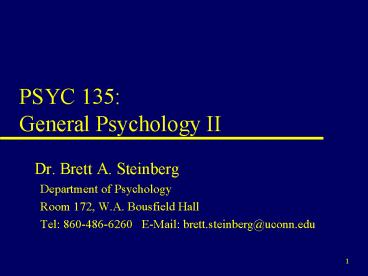PSYC 135: General Psychology II - PowerPoint PPT Presentation
1 / 26
Title:
PSYC 135: General Psychology II
Description:
Arguably the most human of all characteristics. 5. Physiologic Bases ... to be consciously seen, what should happen to reaction times to 'Mustang-Camaro' ... – PowerPoint PPT presentation
Number of Views:90
Avg rating:3.0/5.0
Title: PSYC 135: General Psychology II
1
PSYC 135General Psychology II
- Dr. Brett A. Steinberg
- Department of Psychology
- Room 172, W.A. Bousfield Hall
- Tel 860-486-6260 E-Mail brett.steinberg_at_ucon
n.edu
2
States of Consciousness
3
Overview of Topic
- 1) Definition of consciousness
- 2) Physiologic bases
- 3) States of consciousness
- A) Sleeping and dreaming
- B) Hypnosis and priming
- C) Psychoactive Drugs
4
Definition
- Q What is consciousness?
- Consciousness involves awareness of
- outside world
- own thoughts, feelings, and other mental
processes - metacognition (thinking about thinking)
- Arguably the most human of all characteristics
5
Physiologic Bases
- Consciousness is a complex phenomenon that
depends upon many brain regions and functions - 1) Arousal and receptiveness to stimuli
(brainstem and thalamus) - If damage Coma
- 2) Sustained and selective attention (frontal
cortex, parietal cortex, and midbrain) - If damage Confusion
- 3) Language (left hemisphere)
- If damage Alien hand syndrome
6
Physiologic Bases (Cont.)
- 5) Memory (hippocampus and thalamus)
- If damage Amnesia (H.M.)
- 6) Reality testing (frontal lobes)
- If damage Confabulation
7
Sleeping and Dreaming
- Cycles of sleep and wakefulness regulated by
daily (circadian) rhythms - Pineal body secretes melatonin level varies
during day (Descartes seat of soul) - Environmental cues (zeitgebers, or
time-givers) affect circadian rhythms via
suprachiasmatic nucleus (SCN) of hypothalamus
resets for 24-hour schedule
8
Brain Regions Involved in Circadian Rhythms
9
Sleeping and Dreaming (Cont.)
- Stages of sleep Electroencephalogram (EEG)
- Quiet Stages 1-4
- Active Rapid eye movement (REM)
- As sleep deepens during stages 1-4, frequency
decreases, amplitude increases, and muscle tone
decreases
10
Sleep Architecture
11
Sleep is Active State
12
Sleeping and Dreaming (Cont.)
- Freuds dream theory Wish fulfillment
- Day residue Kernel of dream that is related to
events of day - Manifest content Overt/obvious meaning
- Latent content Covert/hidden (symbolic) meaning
points to patients conflicts
13
Antrobus Cognitive-Process Dream Theory
14
Hypnosis
- Q Have you ever been hypnotized? If so, what
was it like? - Induction involves creation of state of
relaxation and compliance with process - Hypnotizability is necessary but not universal
- Cannot be made to do things against will
15
Explanations of Hypnosis
16
Response to Hot Water (Anterior Cingulate Cortex)
17
Priming
- Means of increasing responsiveness to stimuli via
exposure to previous (related) stimuli - Stem completion Participant reads harp more
likely to complete ha__ as harp than as
hand or hard - Semantic decision Decide whether stimulus is a
word or nonword
18
Unconscious Priming in Semantic Decision Task
19
Psychoactive Drugs
- Substances that influence psychologic functioning
by altering - production,
- action, and/or
- elimination
- of one or more neurotransmitters
20
Classes of Psychoactive Drugs
21
Rates of Substance Use Among High School Students
22
Psychoactive Drugs (Cont.)
- Two types of maladaptive use
- Abuse Use that causes problems in daily
functioning - Dependence Use that results in
- 1) Withdrawal symptoms Negative symptoms when
drug wears off - 2) Tolerance Require more of drug to experience
same effects
23
Tolerance
24
Psychoactive Drugs (Cont.)
- Response to drug is influenced by
- expectancies regarding effects
- context in which taken
25
Conditioned Responses
26
Sample Test Question
- Dave is running a priming experiment in which he
asks subjects to press different keys if pairs of
words are related or unrelated. If car appears
too quickly to be consciously seen, what should
happen to reaction times to Mustang-Camaro? - a) increased reaction time
- b) decreased reaction time
- c) no difference
- d) cant predict answer from information given































